The post Pathology Awareness Australia member organisation spearheads HPV self-collection campaign first appeared on Know Pathology Know Healthcare.
]]>The organisation is launching a nationwide healthcare provider campaign about supporting patient choice in cervical screening. The campaign intends to educate providers about the reliability of HPV self-collection and encourage them to offer self-collection as a choice to all eligible cervical screening patients. This provider campaign begins ahead of a nationwide patient-facing campaign set to debut in September, also funded by the Australian Government, promoting the HPV self-collection option in cervical screening.
Throughout the provider campaign, GPs are being encouraged to contact their pathology providers to:
- confirm that they can process self-collected vaginal samples, or
- confirm that they are able to refer self-collected vaginal samples to an accredited laboratory, if necessary, and
- order the correct collection device and other consumables for offering self-collection, and
- confirm any collection, handling and transport requirements.
The most commonly used device for self-collection in the National Cervical screening Program is a Copan FLOQswab (red top) flocked swab 552C or 552C.80.
Self-collected samples are taken from the vagina, whereas samples from clinician-conducted speculum exams are taken from the cervix. All routine (asymptomatic) cervical screening participants are eligible for self-collection, including patients who are pregnant1 and those with immune deficiency. If HPV is found, follow-up is required.
Self-collection is just as sensitive for the detection of HPV and CIN2+/adenocarcinoma in situ as a clinician-collected sample2 and can help overcome screening barriers in under-screened groups (e.g., privacy/modesty concerns, fears of discomfort and pain, previous trauma, etc.). Currently, over 70% of cervical cancer cases occur in people who have never screened or are overdue. Therefore, self-collection can address disparities by helping engage those who would otherwise not participate in screening—but only if they are provided the choice to do so.
If you are a healthcare provider and want to get up to speed on HPV self-collection and cervical screening, you can visit campaign resource hub to find webinars, podcasts, provider resources, and other CPD opportunities.
You don’t have to be a cervical screening provider to support the campaign – to spread the word about the importance of supporting the choice, you can check out the stakeholder toolkit
References:
- Cancer Council Australia. 14. Screening in pregnancy [Internet]. 2022. Available from: https://www.cancer.org.au/clinical-guidelines/cervical-cancer/cervical-cancer-screening/screening-in-pregnancy
- Arbyn M, Smith S, Temin S, Sultana F, Castle P. Detecting cervical precancer and reaching underscreened women by using HPV testing on self samples: updated meta-analyses. Bmj. 2018 Dec 5;363.
The post Pathology Awareness Australia member organisation spearheads HPV self-collection campaign first appeared on Know Pathology Know Healthcare.
]]>The post Regular health checks encouraged for those living with diabetes first appeared on Know Pathology Know Healthcare.
]]>The study looked at a 15-week period in 2020-2021 and compared pre-pandemic mortality rates with an equivalent period in 2019, accounting exclusively for non-COVID-related deaths.
There were 30,118 non-COVID-19-related deaths in people with diabetes in the 2021 period compared to 27,132 deaths in the 2019 period, representing an 11% increase. The data also captured participation in recommended health checks for people with diabetes.
In 2020-2021, only 853,669 (27%) of the cohort received the annually recommended 8 care processes for people living with diabetes. This was 45 per cent less than 2019-2020, when 1,547,240 people (48%) received all 8 care processes.
COVID-19 containment measures made it harder for people living with diabetes to access regular health checks. As a result, 693,571 people may have missed some of the important health checks and tests to effectively monitor their condition, and reduce the risk of complications, including heart disease and amputations. People with chronic conditions such as diabetes, kidney disease and heart disease need regular pathology tests to manage their condition.
Chair of Pathology Awareness Australia, John Crothers said: “This highlights concerns that we have here in Australia on the impact of reduced participation in healthcare resulting from COVID containment measures during the pandemic. The tragedy of this increase in deaths tells us we need better awareness of the importance of healthcare participation across the board, especially for people with chronic conditions, or at risk of developing them.”
Diabetes Australia Group CEO Justine Cain added, “People with diabetes are at a much higher risk of serious illness from COVID-19 and many people took appropriate steps to limit their risk of exposure to the virus. However, this led to many people missing important health checks.”
Due to the comparable nature of the two countries, and the potential implications beyond diabetes to other chronic conditions the study is worrying for Australian health professionals.
In Australia, routine pathology testing dropped by around 40 per cent across the board at the start of the pandemic and there is concern that many who delayed testing have not yet caught up.
Four of the eight annually recommended care processes listed in the study are pathology tests. These include a glycated haemoglobin check known as HbA1c. This blood test is used to help diagnose and monitor people with diabetes, alongside a cholesterol blood test that looks at the levels of cholesterol and other fats in the blood, a serum creatinine blood test, and urine albumin which are both used to check kidney function.
Chemical Pathologist and PAA ambassador, Graham Jones said: “This study can also be seen to have implications beyond the effects of the COVID epidemic, that for people with diabetes, the best health outcomes require access to full healthcare services, of which regular pathology testing are a major component.”
This study highlights the increased risk of mortality in those living with diabetes who did not receive all eight care processes in one or both of the previous two years.
Diabetes Australia is urging people living with diabetes to keep up to date with their routine management and monitoring diabetes checks, and to not put them off.
Ms Cain said, “We know living with diabetes can be tough and there are a range of different health checks people need to have to stay on top of their diabetes. However, we want to encourage people with diabetes to connect with their diabetes health team. Most diabetes-related complications are preventable if detected early which is why regular health checks are so important.”
Since the beginning of the COVID-19 pandemic, patient diagnosis and monitoring has been severely impacted by Australians missing their health appointments and routine checks.
If patients prefer not to attend health appointments in person, it is possible for a GP to request pathology tests based on a telehealth appointment.
The post Regular health checks encouraged for those living with diabetes first appeared on Know Pathology Know Healthcare.
]]>The post Pathologists concerned as only 27% of those aged 70-74 took part in a cervical screening last year first appeared on Know Pathology Know Healthcare.
]]>Cervical screening participation among those with a cervix
The National Cervical Screening Program monitoring report 2021 from the Australian Institute of Health and Welfare (AIHW) shows that over the 3-year period 2018-2020 only 56% of eligible people took part in cervical screening tests.1
The highest participation rate was for those aged 45-49 at 61%, but for those aged 65-69 participation was 55%, and only 27% of those aged 70-74 took part in cervical screening.
While it is unclear how much of an impact the pandemic has had on cervical screening uptake, routine healthcare participation was significantly affected, with pathology testing rates dropping by around 40 per cent2 in the first months of COVID-19 restrictions.
The National Cervical Screening Program changed from the ‘pap test’ screening model, with those aged 20-69 being tested every 2 years, to the renewed program where people with a cervix are advised to test every 5 years from age 25 to 74. The renewed cervical screening test looks for the Human Papillomavirus (HPV) known to cause the majority of cervical cancers.
As those aged 70-74 were not included in the previous screening model, awareness of the need to test and the availability of testing may be lower in this age group. Discomfort with the method of sample collection may also play a role in low participation rates, but changes have been made to make sample collection easier for patients.
Self-collect as a cervical screening option
In July 2022, self-collection of samples for cervical screening tests became available to all people with a cervix aged 25-74. This means patients will no longer need their doctor or nurse to insert a speculum to collect the cervical sample.
On behalf of Pathology Awareness Australia, Adjunct Professor Annabelle Farnsworth said: “The main thing to remember is that we still see cervical cancers occurring in those aged 45 and up who have no history of cancer screening. This group is also unvaccinated due to their age, and it breaks your heart when you know there is a screening program to prevent these cancers, but they haven’t accessed it for whatever reason.”
This week Adj. Prof Farnsworth encouraged GPs to offer self-collect to their patients and open the conversation with older women particularly.
Anyone who is unsure if they are due for a cervical screening test can ask their healthcare provider to check the National Cancer Screening Register to find out their status.
Adj. Prof Farnsworth added; “We also know that there are other groups who may have lower screening awareness such as people from culturally and linguistically diverse backgrounds, particularly those who came to Australia from countries without cancer screening programs. We also want to encourage awareness in the LGBTQI+ community, anyone who has a cervix should be screened. The beauty of self-collection is that anyone who was hesitant because they didn’t want the speculum examination can now take part in screening.”
Adj. Prof Farnsworth noted that the availability of self-collection was a good starting point for healthcare professionals to raise the topic of testing with under-screened people.
HPV & vaccination rates
Before the pandemic, Australia was leading in cervical cancer elimination due to prevention measures. A 2018 study in The Lancet noted that with a combination of screening and vaccination, Australia could be one of the first countries in the world to eliminate cervical cancer as a public health problem and could do so by 2035.3
However, most women in their 50s, 60s and 70s would not have been vaccinated against HPV, as the National HPV Vaccination Program in schools only began in 2007. Liz Ham, National Health Promotion Manager at Australian Cervical Cancer Foundation said:
“Although we do have great vaccine coverage in Australia due to the vaccination program in schools, there is a cohort of middle-aged and older Australians who missed out on vaccination and can therefore be vulnerable to HPV infection. Migration and travel also mean that some people in Australia are not vaccinated because of where they were born. The vaccine also doesn’t cover every strain of HPV so cervical screening continues to be an important part of cervical cancer prevention.”
Eliminating cervical cancer relies on participation in the HPV vaccination and screening programs in order to effectively diagnose and prevent cancers.
Jean Hailes for Women’s Health CEO Janet Michelmore AO said: “We are keen to remind women about health checks they may have missed due to lockdowns and the pandemic creating disruption in people’s lives. It may seem easy to put off check-ups when so much else is going on, especially if you feel well, but cancer doesn’t discriminate. Early diagnosis is beneficial for almost any health condition so please don’t put off vital screening tests.”
Delayed diagnosis of cervical cancer could lead to the need for more invasive treatment. In 2019, 179 women aged 25–74 died from cervical cancer.1
Read more about how low participation in the national cervical screening program puts Australians at risk of avoidable cancers.
References:
- National Cervical Screening Program monitoring report 2021, downloadable here: https://www.aihw.gov.au/reports/cancer-screening/national-cervical-screening-program-monitoring-rep/formats
- https://www1.racgp.org.au/newsgp/clinical/drastic-drops-in-cancer-and-heart-attack-patients
- https://www.thelancet.com/journals/lanpub/article/PIIS2468-2667%2818%2930183-X/fulltext
The post Pathologists concerned as only 27% of those aged 70-74 took part in a cervical screening last year first appeared on Know Pathology Know Healthcare.
]]>The post International Women’s Day 2022 | Women of Pathology first appeared on Know Pathology Know Healthcare.
]]>Only 50 years ago, studies on children showed that when asked to draw a scientist, more than 99% of the boys and girls involved drew a male scientist. Thankfully, in recent years when this study has been repeated, the gender balance proved less biased, with more than 50% of girls drawing female scientists, but with 90% of boys drawing male scientists, it is clear we still have far to go in #BreakingTheBias, particularly in the world of science.
To support this year’s IWD theme #BreakTheBias, we are shining a light on three incredibly talented women in pathology; Prof Jane Dahlstrom, Dr Lucinda Wallman and Dr Caitlin Keighley.
This year is particularly important, as while pathology is the engine room of healthcare, many people were almost unaware of its existence before the pandemic. Pathology teams have worked incredibly hard over the past two years, ramping up testing to record levels as cases surged, and behind many of these tests are dedicated women scientists. According to the Royal College of Pathologists of Australasia, 46 per cent of their fellows are women, and 53 per cent of pathology trainees are women.* Figures from the Australian Institute of Medical and Clinical Scientists show that 68 per cent of their current members are women.
Prof Jane Dahlstrom, Dr Lucinda Wallman and Dr Caitlin Keighley are three Australian women working in pathology that are making a difference.
Prof Jane Dahlstrom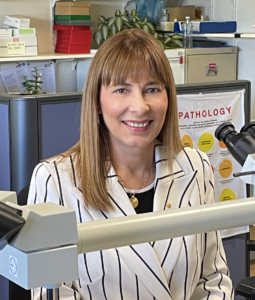
Prof Jane Dahlstrom OAM is Senior Staff Specialist, Anatomical Pathology at ACT Pathology in Canberra, and Chair and Professor of Pathology at the Australian National University Medical School.
Prof Dahlstrom has had a distinguished career in pathology, including important research and work in perinatal pathology and placental pathology to help families who lose babies or have problems during pregnancy.
She also looks after the Pathology Museum at Canberra Hospital which is home to more than 1,200 specimens of human tissue.
Dr Lucinda Wallman
 Dr Lucinda Wallman is Pathologist in Charge of Immunology at Laverty Pathology in North Ryde. She has worked in pathology for more than 20 years.
Dr Lucinda Wallman is Pathologist in Charge of Immunology at Laverty Pathology in North Ryde. She has worked in pathology for more than 20 years.
Although she is also trained as a clinical immunologist and allergist, Dr Wallman is drawn to the diagnostic challenge and investigating what is making her patients unwell.
Dr Caitlin Keighley
Dr Caitlin Keighley is a Microbiologist and Infectious Diseases physician at Southern IML Pathology in Wollongong.
She is a contributor to the Wollongong Antimicrobial Resistance Research Alliance (WARRA) and a senior clinical lecturer at the University of Wollongong.
That’s what she said; quotes from our pathology ambassadors:
On their careers in pathology:
Dr Lucinda Wallman – “Pathology is an ideal career for a woman. It’s challenging and exciting, offers potential for research and teaching, and also allows flexibility to achieve work-life balance, raise a family and continue doing clinical practice at the same time. The pathology landscape is also changing dramatically with innovative new technology, automation and digital pathology on our doorstep. It’s a compelling place to be.”
Prof Jane Dahlstrom – “While doing my PhD I met some pathologists and I realised this was my dream job – it would allow me to combine my passion for research, my enjoyment of teaching, and my desire to be in a job that makes a difference as a medical practitioner. After all, pathologists are the doctors who make the diagnosis of a disease that then determines a patient’s treatment and often their prognosis.”
Dr Caitlin Keighley – “I have worked in pathology for 8 years and I love the diagnostic process. Testing allows refinement of syndromic medicine, which is a blunt tool but pathology sharpens the tools of medicine.”
On their favourite parts of the job:
Prof Jane Dahlstrom – “I really enjoy working in pathology as I am part of a passionate team of scientists, technicians, medical typists, registrars and pathologists who work so hard for a common goal – to give the correct patient the correct diagnosis in a timely fashion.”
Dr Caitlin Keighley – “My favourite part of the job is problem solving. Many people don’t realise that sepsis kills more than heart attacks. In microbiology, finding the answer means finding the cure. There is incredible value in diagnostic certainty.”
Once someone has a diagnosis, they know what to expect, how long it would probably take to get better and what to do.”
Dr Lucinda Wallman – “For me, the best part of my day is getting into the lab and reporting patient samples, correlating results with the other available results and patient history, and teaching the lab staff about interpretation and clinical significance of results. I also love reporting direct immunofluorescence studies on fresh skin samples. Down the microscope you can see the immune system doing damage in real time – and in bright green!”
On their lives outside the lab:
Dr Lucinda Wallman – “I love physical challenges – I spend a lot of time in the gym and spent my spare time in lockdown last year learning to hold a handstand for 30 seconds!”
Prof Jane Dahlstrom – “I enjoy spending time with my husband, children, grandchildren and our wider family as well as enjoy playing card games, playing the piano and making scones”
Dr Caitlin Keighley – “In my spare time, I enjoy Kung Fu, surfing, Latin dancing, and playing the violin.”
Learn more about people of pathology here.
*Figures kindly provided by RCPA
The post International Women’s Day 2022 | Women of Pathology first appeared on Know Pathology Know Healthcare.
]]>The post International Pathology Day – Meet Your Legends of the Lab first appeared on Know Pathology Know Healthcare.
]]>Every day, Australia’s pathology teams work tirelessly to keep us safe from disease. This year in particular, pathology teams have lead the fight against COVID-19.
For the past few weeks, we have asked you to tell us who has been an outstanding member of your pathology team this year.
So here they are, your Legends of the Lab.






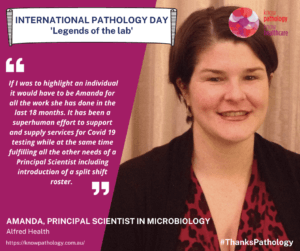




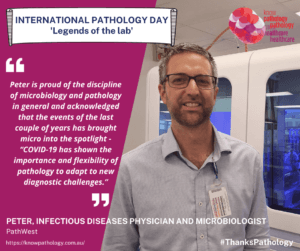
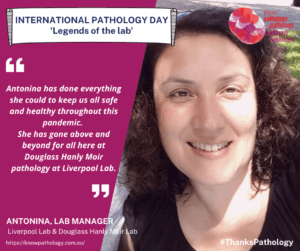



 .
. 
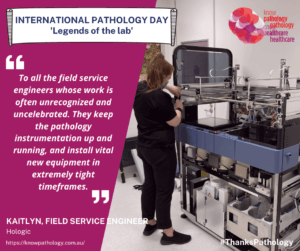 .
. 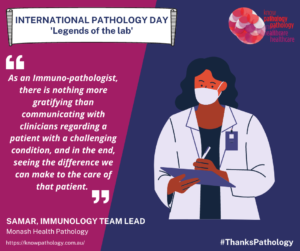
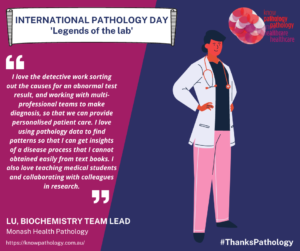 .
. 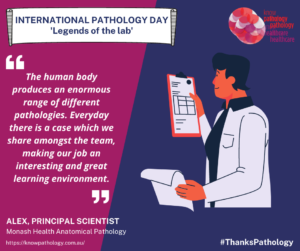
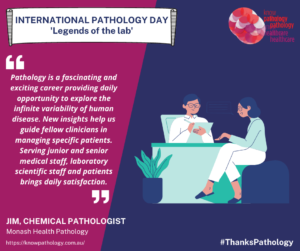
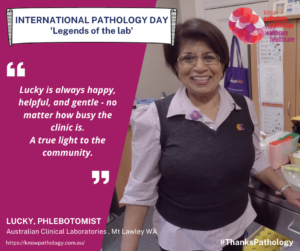




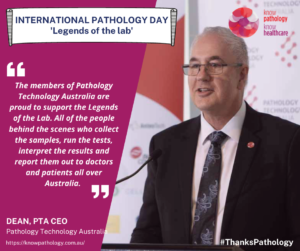 .
. 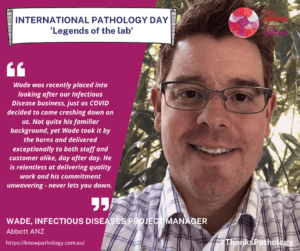
The post International Pathology Day – Meet Your Legends of the Lab first appeared on Know Pathology Know Healthcare.
]]>The post Nominate your Legends of the Lab – International Pathology Day 2021 first appeared on Know Pathology Know Healthcare.
]]>It’s International Pathology Day this coming Wednesday 10th November and we want to know who has been an outstanding member of your pathology team this year.
The pandemic has been tough on everyone but pathology teams have been stepping up in incredible ways since the very start, and rarely get the deserved recognition.
We would like to give shouts out to those special pathology people, both inside and outside the lab, who have gone above and beyond this year, so we need to hear from you.
Whether it’s a colleague who has kept you motivated, a caring leader or a new team member who was thrown in at the deep end and did a great job, we’re all ears.
If you would like to nominate someone for a ‘Legends of the Lab’ shout out please click the button below to email us with a few words on who you would like to nominate and why, along with a photo of them.
A member of our team will then get in touch.
Good on you legends!
The post Nominate your Legends of the Lab – International Pathology Day 2021 first appeared on Know Pathology Know Healthcare.
]]>